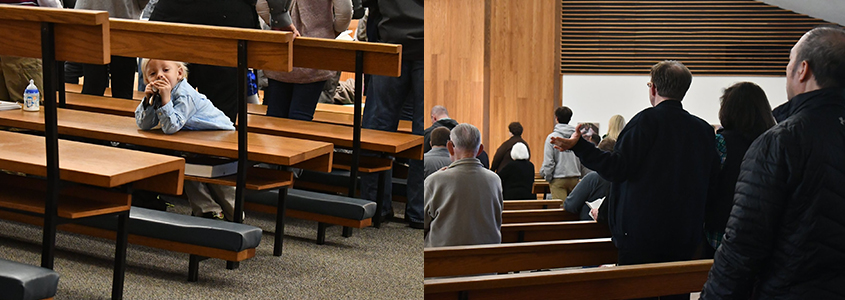This month we celebrate the anniversary of the Americans with Disabilities Act (ADA) which has served to provide accommodations and accessibility to persons with disabilities throughout our nation for thirty-one years. While religious institutions such as the Catholic Church are exempt from required implementation of this act, it is our call as disciples of Christ to work even more diligently to provide opportunities for meaningful participation for persons with disabilities and their families. Though the ADA provides us with a baseline for accommodations and accessibility, as Catholics we are called to meet these basic requirements and delve deeper into providing for the communal and spiritual needs of all God’s people.
God has opened my eyes and heart to ministry with persons with disabilities over the last three years, and I firmly believe that God has called me to be a part of realizing such change in the Church. In 2019, I was working as an Associate Director for the Office for Respect Life Ministries, when we began to explore some initiatives that could promote a better sense of belonging for persons with disabilities and their families. Upon attending Mass at my home parish, which is an incredibly welcoming church, I sat behind a family with a child with autism. His parents were struggling with him as he moved around the pew and played with the books. During the homily he began to recite the alphabet, not loudly, but loud enough for those around him to hear. His mom became quite flustered. I longed to say something to comfort and welcome her, but she was a few rows ahead of me and I didn’t want to make a scene. I resolved that I would encourage her and her husband during the Sign of Peace; however, I never got the opportunity because the entire family left at that time. I watched for them to come back or go to Communion, but they were nowhere to be found.

In this moment, I realized that unless we very intentionally provide opportunities for persons with disabilities, and their families, many will assume that there is an inherent stigma surrounding them. Persons with disabilities, and their families, need more than a welcoming atmosphere—they need to feel a part of the community. I brought the idea of sensory-friendly Mass to my director, and he was enthusiastically on board. We formed a task force and in six months had four parishes providing monthly sensory-friendly liturgies at a regularly scheduled Mass.
I decided to grow my knowledge base and began taking courses for a Special Needs Ministry Certification through the University of Dayton’s Virtual Learning Community for Faith Formation (VLCFF). In November of 2019, I attended Recognizing the Body of Christ, in Washington DC, a conference co-sponsored by the National Catholic Partnership on Disability and the Institute for Human Ecology. It was at this event that my passion for ministry with persons with disabilities was ignited. I met so many incredible people who were intent on recognizing all members of the Body of Christ. As I spoke with more people and learned of disability initiatives across the nation, it was almost as if pieces of a large puzzle were being assembled in my mind. I left the conference with the resolution that I would write a proposal for the formation of an Office for Persons with Disabilities in the Archdiocese of Cincinnati.
In May of 2020, the Office for Persons with Disabilities was officially realized, and we began our mission to create a culture of inclusion and meaningful participation for persons with disabilities, and their families, in the Archdiocese of Cincinnati. While we are still a fledgling office, we are wholeheartedly working to educate, advocate, and assist our parishes with next steps in the necessary efforts towards establishing a better sense of belonging in our Church.
When we fail to invite, welcome, and accompany persons with disabilities in our parishes, we fail the entire family. The families we fail often leave the Church entirely. Parents and caregivers are strong advocates for family members with disabilities, and when opportunities are lacking in a parish, they seek out other faith communities to meet their spiritual needs. Now is the ideal time to begin an important paradigm shift in our Church. It is essential that we focus on intentional accompaniment rather than reactive inclusion. As followers of Jesus, we are called to “go and make disciples of all the nations.” If we simply wait for persons with disabilities to come to us to seek accommodations and accessibility, we are failing to realize our call. Let us actively seek, welcome, and accompany persons with disabilities and their families, so that every member of the Body of Christ can live out their vocation and contribute their God-given gifts to the Church.
Written by Noelle Collis-DeVito, Associate Director of the Office for Persons with Disabilities in the Archdiocese of Cincinnati.
The content contained in this post and on this site are the opinions of the individual author and do not necessarily reflect the official policy or position of the National Catholic Partnership on Disability.
© The National Catholic Partnership on Disability 2021

